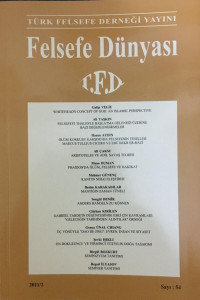Abstract
In Chinese History, Spring-Autumn and Warring States Period (BC.770-
BC221) are the periods of turmoil in which many political, economic and social
problems have arisen. This period, at the same time, is philosophically also a
very rich period in which many thinkers have emerged and many schools of
thought have been established in order to bring peace and order to their countries.
Lao Tzu, the founder of The Dao School of Thought, has an important
place among the thinkers of the period. “Universe” and “Things” are the two
basic concepts of the philosophy of Lao Tzu. Based on the natural order of the
universe, Lao Tzu offers an ideal way of life that could be a good example for a human being as a superior thing. For that, the most important argument is about
“inaction” (無為). According to Lao Tzu, a human should have the features such
as weakness and softness as good virtues, seen in many examples in nature.
Keywords
References
- Fang Dong Mei, “Zhongguo Zhe Xue Zhi Jing Shen Ji Qi Fa Zhan” (Çin Felsefesinin Ruhu Ve Gelişimi), Cheng Jun Chu Ban She, Taipei, 1984.
- Gao, Shu Fan, “Zheng Zhong Xing Yin Yi Zong He Da Zı Dian” (Zheng Zhong İm, Ses, Anlam Büyük Sözlük), Zheng Zhong Shu Ju, Taipei, 2003.
- Ma, Da Wen ve Guo Qi Yong, “Xin Bian Zhong Guo Zhe Xüe Shi”(Yeni Derleme Çin Felsefe Tarihi ), Renmin Chu Ban Shi, Pekin, 2004.
- Okay, Bülent , “Konfuçyüs”, Okyanus Yayıncılık, İstanbul, 2004.
- Tang, Jun Yi, “Zhongguo Zhe Xue Yuan Lun Dao Lun Pian” (Çin Felsefesi Temel Teorisine Giriş), Taiwan Xue Sheng Shu Ju, Taipei, 1986.
- Xü, Fu Guan, “Zhongguo Ren Xing Lun Shı˙Xian Qin Pian” (Çin İnsan Doğası Tarihi Ön Qin Dönemi), Taiwan Shang Wu Shu Guan, Taipei, 2003.
- Wang, Bang Xiong, “Lao Tzu De Zhe Xue” (Lao Tzu Felsefesi), Dong Da Tu Shu You Xian Gong Sı, Taipei, 1980.
- Wu, Yi, “Lao Tzu Jie Yi” (Lao Tzu’yı Yorumlamak) San Min Shu Jü, Taipei,2003.
- Yü, Pei Lin, “Lao Tzu Du Ben”(Lao Tzu’nın Kitabı) San Min Shu Jü, Taipei, 2004.
Abstract
Çin Tarihinde İlkbahar-Sonbahar (M.Ö.770~M.Ö.476) ve Savaşan Beylikler
(M.Ö.476-M.Ö.221) Dönemleri ülkede siyasi, ekonomik ve sosyal açıdan
pek çok sorunun ortaya çıktığı bir kargaşa dönemidir. Aynı zamanda, ülkede
barış ve huzurun yeniden sağlanması için pek çok düşünürün ortaya çıktığı ve
düşünce okullarının kurulduğu, felsefi açıdan oldukça zengin bir dönemdir.
Dao Düşünce Okulunun kurucusu olarak bilinen Lao Tzu; bu düşünürler arasında
önemli bir yere sahiptir. Lao Tzu felsefesinin temelini iki önemli kavram
oluşturmaktadır. Bunlar; evren ve varlıktır. Lao Tzu; evrenin mükemmel düzeninden
yola çıkarak, varlıkların en üstünü olan insana örnek olabilecek ve toplumu
yeniden huzura kavuşturacak ideal bir yaşam biçimi önermektedir. Bunun
için en önemli savı; “edimsiz eylem” (無為)dir. Ona göre; zayıflık, güçsüzlük,
yumuşaklık gibi özellikler birer erdemdir. İnsan da, doğada pek çok örneği görülen
bu özellikleri kendine örnek almalıdır.
Keywords
References
- Fang Dong Mei, “Zhongguo Zhe Xue Zhi Jing Shen Ji Qi Fa Zhan” (Çin Felsefesinin Ruhu Ve Gelişimi), Cheng Jun Chu Ban She, Taipei, 1984.
- Gao, Shu Fan, “Zheng Zhong Xing Yin Yi Zong He Da Zı Dian” (Zheng Zhong İm, Ses, Anlam Büyük Sözlük), Zheng Zhong Shu Ju, Taipei, 2003.
- Ma, Da Wen ve Guo Qi Yong, “Xin Bian Zhong Guo Zhe Xüe Shi”(Yeni Derleme Çin Felsefe Tarihi ), Renmin Chu Ban Shi, Pekin, 2004.
- Okay, Bülent , “Konfuçyüs”, Okyanus Yayıncılık, İstanbul, 2004.
- Tang, Jun Yi, “Zhongguo Zhe Xue Yuan Lun Dao Lun Pian” (Çin Felsefesi Temel Teorisine Giriş), Taiwan Xue Sheng Shu Ju, Taipei, 1986.
- Xü, Fu Guan, “Zhongguo Ren Xing Lun Shı˙Xian Qin Pian” (Çin İnsan Doğası Tarihi Ön Qin Dönemi), Taiwan Shang Wu Shu Guan, Taipei, 2003.
- Wang, Bang Xiong, “Lao Tzu De Zhe Xue” (Lao Tzu Felsefesi), Dong Da Tu Shu You Xian Gong Sı, Taipei, 1980.
- Wu, Yi, “Lao Tzu Jie Yi” (Lao Tzu’yı Yorumlamak) San Min Shu Jü, Taipei,2003.
- Yü, Pei Lin, “Lao Tzu Du Ben”(Lao Tzu’nın Kitabı) San Min Shu Jü, Taipei, 2004.
Details
| Primary Language | Turkish |
|---|---|
| Subjects | Philosophy |
| Journal Section | Research Articles |
| Authors | |
| Publication Date | December 15, 2011 |
| Submission Date | October 6, 2011 |
| Published in Issue | Year 2011 Issue: 54 |
Philosophy World is licensed under a Creative Commons Attribution-NonCommercial 4.0 International License.


